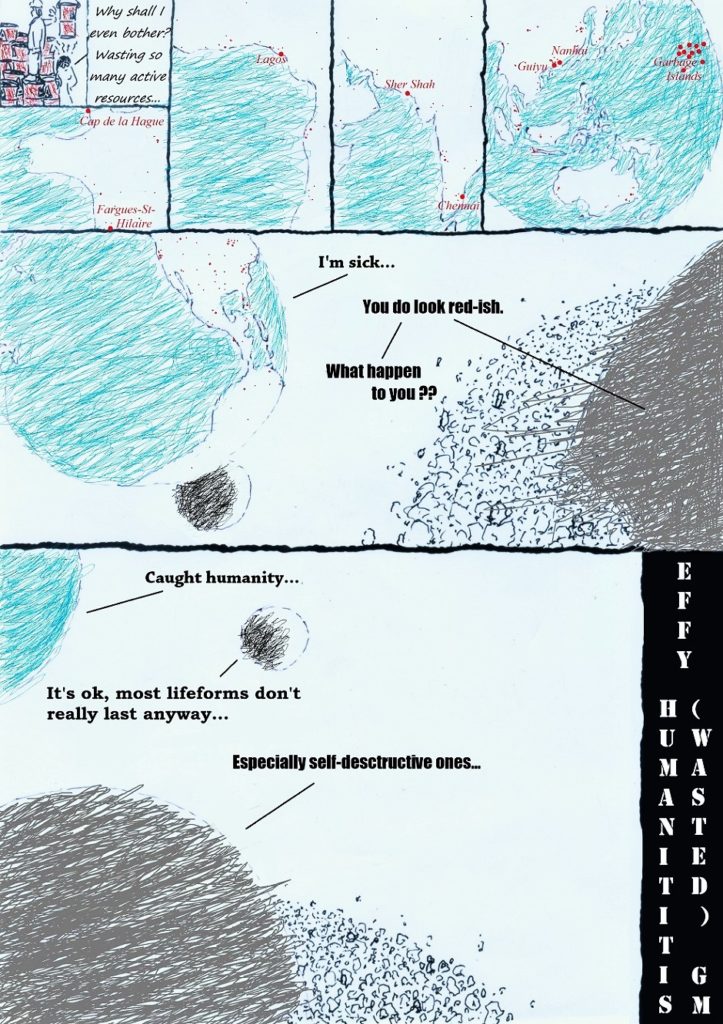Effy Creations is proud to presents the first four episodes of G.M.’s new ongoing webcomic series: “Effy – The Living Efficiency“.
The series follows the adventures of Effy, the concept of “efficiency” personified. Cynic, satiric, with Effy, G.M. found a new managerial dogma to play and experiment with after Stand(H)ard.
Over the first four episodes, Effy covered GMO, taxation, nuclear waste, marketing mix and celestial bodies’ fever, to name a few subjects.
New episodes now available every week.
Like it or not, marketing is a fundamental part of any successful project. Theories have evolved tremendously but the fundamental marketing mix approach remains a core concept. For those not familiar, here is the wikipedia page for more details: http://en.wikipedia.org/wiki/Marketing_mix In a nutshell, the marketing mix originally defined 4 P’s that any business/project/idea (or whatever it is you want to do), must focus in order to meet its market. The 4 original P’s were Product (solution to fill your market need), Price (amount your market value your solution), Promotion (message to communicate your solution to your market) and Place (location to reach your market). With time, the list of P’s extended with latest theories adding People, Productivity and so on. Effy aims at being just that… efficient. Theories seldom have empathy; Effy’s world is a theoretical place.
Constructive comments welcome! G.M.
Governments love couples. It’s slightly more reasonable than individuals; it’s a step closer to better demographic (and without the hassle of importing people); it’s just the ideal foundation for stable society. Tax authorities have a wide range of policies and measures to support and promote this ambition. Lower tax brackets (averaging income disparity), higher tax breaks, specific exclusions, all are benefits targeting couples. Tax burden can be significantly lowered for two individuals when filing as a couple, and consulting with tax professional is geerally worthwhile. Some countries even have specific allowances on top of tax reliefs. Unfair? Maybe… but today Effy focused on taxpayers’ efficiency.All things considered, taxation is only one tiny example of all potential economies of scale specific to couple life. Lower rent / person. Lower living costs / person. And it goes endlessly. So psychological reasons aside, economy alone is enough for anyone to consider couple life. What about love in all that? A chemical stuff… maybe. “Honey… tax season is around the corner, so come and bring in your big fat invoice…” Exciting night ahead!
Constructive comments welcome! G.M.
Sode Matha (or Sode Mutt) is a temple dedicated to Krishna, located in Udupi district India. At this particular temple, it is customary to bring brinjal offerings (brinjal being the Indian eggplant). Nothing exceptional so far… that is until a company started producing genetically modified brinjal. Early 2010, the temple made the news as local population started to fear the potential retaliation resulting from these corrupted offerings. The matter became rather serious, especially as locals were unable to distinguish between non-GMO and GMO brinjal. Some riots followed. Case of biopiracy were also brought forward. Eventually, the matter got out of news feeds so the end of the story remains unknown, at least to me. Skeptics would ridicule the whole thing. Believers would feel slightly concern that humans playing god might actually offend them. I for one choose to cherish that glimpse of poetic mystery only divine riddles can create. As for Effy… she’s probably ambivalent. On one hand GMO are engineered to improve productivity. On the other hand, nature has been quite efficient on its own for long enough to deserve some kind of trust and respect. So leaving the case up to the divine oddly make sense.
Constructive comments welcome! G.M.
Effy’s pissed.
Efficiency is defined by the amount of outputs a process is able to generate, out of all the resources it uses. The easiest example would be financial efficiency, as all inflows and outflows can be measured with a common unit: money. That’d make: financial efficiency = amount of money generated (flowing out) / amount of money invested (flowing in). Quite straightforward, anything over 100% would be efficient, and anything below would be inefficient, with the gap being… wasted. Applied in general fields, wastes result from inefficiencies, though not necessarily financial ones. For example. a sale staff from a Shanghai luxury shop might be wasting his time during coronavirus as time will never be gained back (and by exposing himself, the lifespan of the person might even reduce overall). However by selling two bags in one day, the process itself might still be financially efficient for the shop owner as the price will be enough to cover the good, the sale staff salary for the day, the rent, utilities, etc.. Unfortunately, not all wastes generated from financially efficient processes are as benign as the cashier’s waste of time. On the contrary, some wastes have very high toxicity, making it easier now to understand why Earth looks a bit feverish. Since financial efficiency seems to be the main scale used to assess a process overall efficiency, a better grasp of wastes toxicity in the model is becoming urgent. One way would be to increase the negative value of these toxic outputs, another would be to consider the curing cost as monetary inflows (for example imposing the provision for waste treatment and asset closure in financial accounts).
Constructive comments welcome! G.M.












